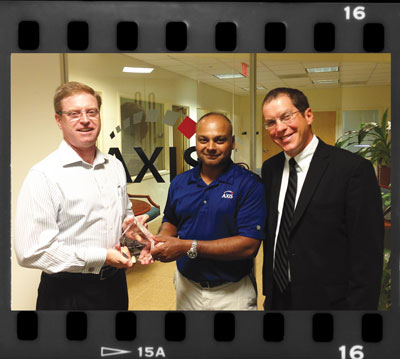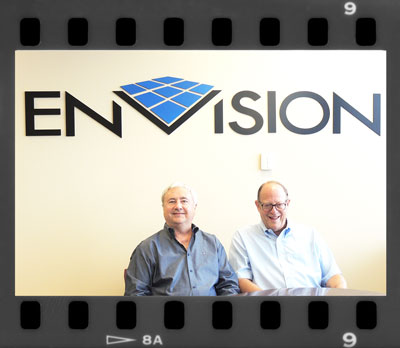In-Depth
2013 RCP Rocket Awards: Meet the Winners
Three companies earned our inaugural award for sustainable business growth. See how winners Axis Group LLC, Envision LLC and Intellinet Corp. planned and executed their way to success.
- By Scott Bekker
- October 21, 2013
Sustainable growth is the holy grail of business.
Anyone can get lucky for a year or two by stumbling into the right market with the hot product or service offering. Others will rob profitability to goose revenues or inflate revenues by shaving profits to create the appearance of lasting success.
Gaining both revenues and profits at the same time, and keeping them growing for three years or longer, requires solid business strategy.
That's the idea behind the inaugural RCP Rocket Awards honoring excellence in growth. The awards are a joint project of Redmond Channel Partner magazine and Minneapolis-based Revenue Rocket Consulting Group, which is run by longtime RCP columnist Mike Harvath.
RCP and Revenue Rocket, each in their own way, have dedicated themselves to helping IT services companies become more successful -- RCP as an independent advocate for Microsoft partners, Revenue Rocket as an IT services growth consultancy.
The award was open to U.S. IT services companies with revenues between $5 million and $75 million a year and impressive growth stories. This award isn't just about numbers, though. As submissions rolled in from January through May of 2013, the selection committee looked at revenue and profit growth rates over a three-year period.
The main part of the process, though, was combing through the submissions for the strategies. What unique combination of strategies did companies employ to generate the results they achieved?
In the end, we named three winners for the inaugural RCP Rocket Awards -- Axis Group LLC, Envision LLC and Intellinet Corp. Each company is different from the others, and all three chose and executed on classic business strategies in ways unique to their circumstances.
"What stood out for me among all three winners was how each company resolved to focus their business, in terms of technology set, verticals and strategic initiatives," says Harvath, CEO of Revenue Rocket and one of the judges. "It's the one thing we advise all our clients do to accelerate the growth of their business. These companies are a testament to how effectively this strategy drives profitable growth."
Each company's story is told in profiles over the next few pages (along with a brief note from Harvath about why each won). Congratulations to the first class of RCP Rocket Award winners!
RCP Rocket Award Winner Profile: Axis Group
Albert Hughes felt a little skittish when SAP AG announced it was buying Business Objects in 2007.
Axis Group LLC, which Hughes had founded 11 years earlier, was a heavy Business Objects partner. The signals Hughes was receiving as the deal steamed toward completion in early 2008 made him wonder if partner companies like his might be less important to SAP than they had been to Business Objects.
 RCP Editor in Chief Scott Bekker (right) presents an RCP Rocket Award to Axis Group principals Al Hughes (left) and Ranjan Sinha (center). Axis Group focused tightly on one business intelligence vendor and a small number of verticals to maximize business growth.
RCP Editor in Chief Scott Bekker (right) presents an RCP Rocket Award to Axis Group principals Al Hughes (left) and Ranjan Sinha (center). Axis Group focused tightly on one business intelligence vendor and a small number of verticals to maximize business growth.
The situation wasn't critical because Axis Group used a broad portfolio of business intelligence vendors and could make up for any drops in Business Objects-related work with other projects. But it definitely got Hughes, the principal, CEO and CTO of Axis Group, looking around. "We've typically had a vendor that was a lead one," Hughes said in an interview at the Axis Group headquarters in Berkeley Heights, N.J.
Starting to disengage from SAP/Business Objects turned out to be a blessing in disguise for Axis Group, because it started a process of weaning the business intelligence solution provider off almost all but one vendor solution. That focus, in turn, helped catapult Axis Group to growth.
Hughes and others at Axis Group had been keeping an eye on QlikView, a product that combined extract, transform, load (ETL), data warehousing and a visual-analytic front-end. A few years earlier, the product seemed promising but unready for Axis Group's customers. As the SAP situation developed, Hughes and company took another look.
"We were pretty amazed at what it could do. Applying the technical capabilities and the business acumen of our people, we could [build solutions] in a very fast fashion," said Hughes. "We decided to start focusing on that."
By then, the economic downturn was upon the industry, and it further spurred Axis Group to simplify, said Hughes' fellow principal Ranjan Sinha, who has responsibility for strategy, product development, sales and marketing.
"This was our first time that we said everybody's going to have to go through the same boot camp for QlikView; everybody's going to have to know the same thing," Sinha said. "We actually eliminated other technologies. It was the first time in our careers we actually said, "No, we don't want to be your partner anymore.' We got rid of the contract [for other vendors]."
At the same time, Axis Group also focused its sales efforts into specific verticals rather than selling to any company with business intelligence needs. It was another way of being more targeted and less opportunistic. The company currently offers solutions for health care; manufacturing, retail, distribution (MRD); energy and utilities; and financial services. Having the vertical focus helps the company build repeatable (and therefore more efficient) sales and implementation processes.
The strategy has helped Axis Group more than double its revenues over the last three years while substantially increasing profits. Focus also brought Axis Group into a much more productive relationship on QlikView than it enjoyed with previous vendor partners. Axis Group earned the 2012 "Solution Provider of the Year" award from the product's parent company, QlikTech International AB.
Hughes sees a virtuous circle in the multi-year focus of Axis Group on one vendor's solution. "An important thing the focus brings is expertise. Everybody in the organization has to have expertise in that core component. We have ancillary technology for the complete solutions, but everything that we focus on is really three things -- the people, the process and the technology," Hughes said, adding with a chuckle: "It's a combination of good technology and good implementation and you can get really rocket-type results."
RCP Rocket Award Winner Profile: Envision LLC
Sometimes overnight success takes decades.
That's been the case for one of the 2013 RCP Rocket Award winners, Envision LLC.
The company has been building revenues and growing since its founding in 1983, but a confluence of economic and industry trends and some savvy moves by the St. Louis-based services provider's management over the last few years prompted a sharp increase in revenues and profits.
Until recently Envision, which also has offices in Phoenix, spread its efforts among three businesses. The main focus was on IT staffing, but the company also did substantial IT project work and had a side business in hosting.
As the economic downturn intensified a few years ago, staffing had the potential to be a good business. Fewer companies wanted to commit to hiring new employees, but many still needed on-site staff to get critical projects going. The conditions spelled opportunity for firms with established IT staffing businesses such as Envision.
 President and CEO David Jaenke (left) and Chairman Steve Lowy (right) cut IT projects and hosting from the Envision LLC portfolio in order to focus on the core strength of IT staffing.
President and CEO David Jaenke (left) and Chairman Steve Lowy (right) cut IT projects and hosting from the Envision LLC portfolio in order to focus on the core strength of IT staffing.
The company's connections and credentials in staffing have always been strong -- it has been working with companies of all sizes, including many in the Fortune 500, for three decades now.
Rather than trying to pursue all of the newly available opportunities through its three existing avenues of staffing, projects and hosting, Envision's management decided to strategically focus on one business and then monitor and manage it very carefully.
"Three years ago we decided to focus only on IT staffing and to put all of our time and effort into one service section," explains Steve Lowy, chairman of Envision.
The company's staffing offerings range from positions with management responsibility, such as project managers, technical leads, systems architects, business analysts and business-continuity consultants, to task-oriented jobs like help desk, technical writing and administrative professionals.
Envision launched a few initiatives to make the staffing business more successful.
One approach was to spur organic growth by building up the number of account managers who were calling on new customers from both the Missouri and Arizona offices.
At the same time, Envision ramped up its recruiting efforts to create a bigger pool of consultants that could be hired out to customers. That effort involved new social media campaigns, aggressive employee referral programs and a "Friends of Envision" non-employee referral program. Envision regularly tweaks the referral programs to reinforce elements that are showing success.
Retention of consulting talent through skills development became even more of a focus, as well.
Combined, those staffing efforts have pushed Envision to a United States footprint of 268 employees working in 23 states.
With all Envision's eggs in the one staffing basket, Lowy has kept careful watch on hiring trends. "Envision has learned to be a flexible company, offering several business models -- IT contractors, six-month right-to-hires and direct-hire placements," Lowy says of the company's ongoing efforts to make sure the types of staffing services Envision offers remain in line with how corporate customers want to consume them.
This narrowing of the business to one strong element and watching it carefully led to mid-double digit annual increases in revenues that have led to a more than 100 percent growth rate over three years. Growth in EBITDA is equally strong.
RCP Rocket Award Winner Profile: Intellinet Corp.
In mid-2010, Atlanta-based Intellinet Corp. was struggling. A tough recession in the technology services industry and a strategic plan that had not kept up with the changing marketplace had plagued the firm's productivity.
While Intellinet was a highly regarded firm with over 40 regional, national and worldwide Microsoft awards, revenue had fallen flat and was beginning to decline. Some years were profitable, while other years operated at a loss, resulting in a breakeven business. Over the years, employee morale suffered and Intellinet faced a crisis of identity and performance.
 Mark Seeley took over as president and senior partner of Intellinet Corp. in 2010 and focused the company on a new five-pillar strategy.
Mark Seeley took over as president and senior partner of Intellinet Corp. in 2010 and focused the company on a new five-pillar strategy.
"When the recession hit and Intellinet experienced operating losses in the first half of 2010, the Board evaluated the company's viability and realized if Intellinet was going to thrive once again, it needed to reposition its go-to-market strategy, management team and overall operations," said Frank Bell, founder and chairman of the 20-year-old Microsoft-centric technology services firm.
For that task, the company tapped an internal executive to become its new president and senior partner. Mark Seeley had joined Intellinet in 1996, just a few years after the systems integration firm was founded. In addition to his experience with internal operations and key Intellinet accounts, Seeley was a proven entrepreneur, trained in strategy and process consulting from Andersen Consulting, who garnered respect from fellow executives as a strategic thinker and business-minded leader.
Seeley and his management team got right to work. The company had strong brand recognition as a result of over 5,000 client engagements in over 40 states with a great reputation for service, and also boasted a world-class profile within the Microsoft ecosystem with multiple Microsoft "Worldwide Solution of the Year" awards.
Seeley concentrated on the need for a long-term growth strategy beyond the company's core systems integration work. He and his management team laid out a five-year, five-pillar plan to carry the company forward and meet clients' future needs. The pillars were Technology Projects, Management Consulting, Cloud Solutions, Product Integration and the Intellinet Delivery Center.
Technology Projects and Product Integration grew naturally out of the company's historical business, and Seeley created a new internal review committee to ensure all projects met business requirements and used or created repeatable assets. Crucial, however, to Intellinet's strategic transformation was its move upstream to "lead with Management Consulting" -- a business alignment philosophy making Intellinet more strategic and valuable to its huge client base.
Intellinet also doubled down on its early efforts in Cloud Solutions, mirroring the 2010 Microsoft Worldwide Partner Conference messaging of "we're all in" from Microsoft, having already brought over 75,000 seats to the early Microsoft cloud. Intellinet saw the opportunity within the cloud and became an early Microsoft Cloud Accelerate partner. The final piece to Seeley's vision involved creating a new Intellinet Delivery Center, which would serve as the foundation for large-scale development projects and its managed services offerings.
"These five pillars have proven to be a successful strategy for our firm. The second half of 2010 brought about a new go-to-market strategy, financial stability and a purposeful initiative to become a world-class consultancy," Seeley said. "In 2011, revenue increased 11 percent and operating profit increased 810 percent. In 2012, revenue increased 26 percent and operating profit increased 83 percent. The growth in core services, as well as the additional gross profit provided by product incentives and stronger partnerships, have provided a strong foundation for Intellinet's further expansion into new regions and targeted acquisitions of other regional service providers."
"Throughout our turnaround and subsequent growth, we have remained committed to building a best-in-class company culture," Seeley stated. Intellinet has racked up over a dozen awards in the past three years, including having been named a 2013 "Best Small Firms to Work For" by Consulting Magazine. "This recognition validates the hard work in pursuing our vision of being a 'profitable, growing company that delights customers and provides an excellent experience for our employees.'"
With a solid focus on cloud solutions and linking all technology projects to their underlying business objectives, Intellinet has delivered 32 consecutive months of profitability and counting, and seems poised for strong growth in years four and five of the plan.